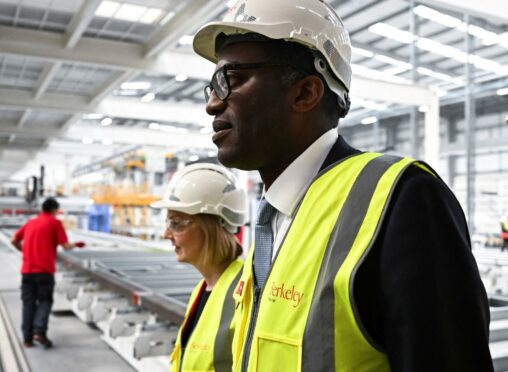
Liz Truss might have made a promise to get Britain moving again but what she didn’t clarify is in which direction.
After three weeks in her job, two of them paused by the death of the Queen, and a “fiscal event” that her chancellor did not refer to the Office for Budget Responsibility for fear of stark facts interfering with wishful thinking and self-delusion, the country’s economy is in flames.
Within hours of Kwasi Kwarteng’s “mini budget’” the pound tanked, the UK’s pension funds were brought to the brink, the financial markets spiralled into chaos, thousands of mortgages were taken off the market, and with the Bank of England preparing to print money for a bail-out, a stinging rebuke reminiscent of previous currency crises, from the fiscal watchdog, the International Monetary Fund, elevated Britain from being just one European nation struggling to cope with a challenging economic outlook, to being a financial basket case and a global laughing stock.
Life comes at you fast in politics but with calls already being made – from within her own party – for the new prime minister and her allegedly super-intelligent but apparently witless chancellor to step aside, this was an act of unnecessary self-harm by the new Tory leader that no one, bar Truss and her Downing Street neighbour, could understand.
And in some ill-thought-out, economically illiterate, and uncosted attempt to go for growth by cutting the highest rate of tax for the country’s richest, the only inevitable outcome was to make the rich, richer and the rest of us poorer.
As a result, any financial or political gains from the government’s much-heralded support package to put a cap on energy prices were wiped out and more, by the eye-watering consequence of the chancellor’s other, less trailed but much more politically significant, plans around cutting tax for those that least need it.
Financial markets don’t like surprises and as they struggled to catch up with any rationale behind the tax cuts, the conclusion was already being seen on the City’s flashing screens. And while millions poured into the coffers of speculative hedge fund managers who capitalised on the market chaos by shorting on the pound, ordinary mortals watched in terror as interest rates soared and their mortgage rates flew through the roof.
A pending housing crisis caused by mortgage defaults and inevitable rent rises, could now easily be added to the multi-faceted crises that the government is already wrestling with in energy, cost of living, climate and a war in Europe.
During her campaign to be leader, Truss made clear her disdain for what she saw as an economic orthodoxy which she said had failed to achieve growth for the country.
She knew better than the experts in the City and big brains in the Treasury, and her uncompromising Thatcher cosplay made her sound radical, gutsy, and willing to take on the markets. Tory members like that. It echoes “taking back control”. But last week proved to be just an act of sheer stupidity by an arrogant and uncompromising Tory PM who believed she knows best, and she could best the market.
If you can’t take from the rich, you take from the poor, and when you wrap the injustice of it all in a false narrative that talks of the politics of envy or the feckless poor, then ideologically you could argue, which I am sure Truss does, that you are on the right side of policy.
But even the truest of blue Tories are finding this unpalatable. There is no post-leadership election bounce for Truss and on the eve of her party conference, her first as leader, and with four opinion polls predicting Labour to be the next government, by some margin, Truss may have been on a mission for growth but stimulating support for Labour might not have been the increase she was looking for.

Enjoy the convenience of having The Sunday Post delivered as a digital ePaper straight to your smartphone, tablet or computer.
Subscribe for only £5.49 a month and enjoy all the benefits of the printed paper as a digital replica.
Subscribe